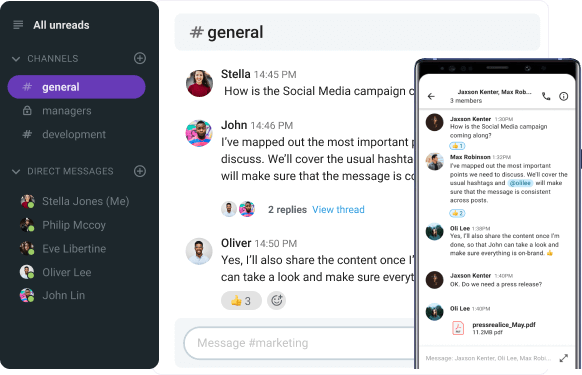Did you know that research on time spent communicating shows that we spend 50%–80% of a workday communicating?
With that in mind, we shouldn’t underestimate the importance of communication at work, and we should do our best to make it effective.
One of the great ways to improve communication at the workplace is undoubtedly to incorporate fun and humor, which helps people come together and create a positive working environment.
Thanks to multiple communication channels, there are dozens of ways to add safe humor to your communication and make work fun. One of the best and easiest ways to introduce humor to workplace communication is to write fun and humorous email sign-offs that evoke emotional reactions and generate replies.
In this blog post, you’ll find out which email sign-offs are more cheerful than “Cheers”, better than “Best”, and warmer than “Warmest”.
So, let’s start!

Table of Contents
Humorous email sign-offs
A witty sign-off is an effective way to end an email addressed to your colleague who knows you well and understands your humor.
To maintain good relationships with your colleagues, you can make your emails entertaining by adding the following email closing lines:
See ya later, alligator!
If you want to put a smile on your colleague’s face, adding “See ya later, gator” at the end of an email is a good way to do so.
This catchphrase is a funny way to tell someone “Goodbye” or “See you soon”, and comes from a popular rock-and-roll song of the 1950s.
Hasta la vista, baby!
This is a funny email sign-off you can use when emailing someone you have a close relationship with.
“Hasta la vista, baby!” became a catchphrase of Arnold Schwarzenegger in his role in the cult movie Terminator 2 from 1991, and it means “Until the view”.
Catch you on the flip side!
Another popular phrase you can add at the end of your emails is “Catch you on the flip side!”, which means “See you later”.
Later, tater!
Later, tater is a funny and playful email sign-off you can use to close both personal and professional emails, as an alternative to “See you soon”.
Peace out!
To say “goodbye” and “peace be with you” at the same time, you can use the slang term “Peace out” as a funny and friendly email sign-off when emailing your colleague.
G2G, Bye
G2G is an acronym for “Got to go” that people use as an email sign-off when they have to (or want to) end the conversation. What’s more, this is a good way to sign off when you have to go offline immediately.
May the Force be with you!
When you want to wish your peers good luck with an upcoming project, “May the Force be with you” is a good choice to close your email.
If you’re looking for additional ways to close your emails in a funny manner, here are some examples of email sign-offs you should consider:
Live, laugh, love!
That’s all, folks!
Live long and prosper!
Thank goodness it’s Friday!
Are you still reading this?
Stay frosty! (As an alternative to “Stay cool”)
Congrats on reading this whole email!
Have a great procrastination!
To infinity and beyond!
One step closer to Friday!
At a loss for words.
Gen Z email sign-offs
Since Generation Z entered the workforce, the workplace has become more dynamic, and some common email sign-offs have been left in the past.
Here are some of the funny email closing phrases that Gen Zers are currently using:
Bless up!
Cold regards,
Mean regards,
Slay, serve, survive!
Another day another slay!
Stay slaying!
Please hesitate to reach out.
Live, laugh, leave me alone.
Hasta La Pasta!
Hakuna Matata!
💡 Pumble Pro Tip
In a multi-generational workplace, some of the common challenges that might arise due to communication differences are miscommunication and language barriers. Find out how to overcome these communication barriers in our blog post:
Creative email sign-offs
If you’re looking for other types of fun email sign-offs, you can consider creative and adventurous email closing lines such as:
Cheers to an amazing week ahead!
Cheers to a great day!
Keep calm and carry on!
Complimentary email sign-offs
As compliments are a free and easy way to make someone’s day, adding them to your email can inspire and make the recipient feel good about themselves.
Here is the list of some complimentary email sign-offs that boost employee morale:
You’re an inspiration!
Stay amazing!
You rock!
Keep up your great work!
Great to have you on the team!
Great working with you!
Grateful to have worked with you!
Congratulations!
Motivational email sign-offs
Another way to inspire your colleagues and encourage them to keep up the good work is to use motivational and supportive email closing phrases.
When writing emails to your peers or business partners, you can pick some of the following motivational email sign-offs:
Sending positive vibes your way!
Hope this helps!
Keep your head high!
Keep up the good spirit!
Looking forward to hearing about your continued success.
Rock on!
Keep on keeping on.
Wishing you good vibes.
Anticipatory email sign-offs
According to the study about the influence of anticipation on mental health, anticipating positive events leads to better well-being.
Therefore, incorporating an anticipatory sing-off is a powerful way to close your email and spread positive energy.
Next time you craft an email to your coworker, spread happiness and make them anticipate good things by adding an effective closing line such as:
Have a splendid weekend!
Safe and happy travels!
Looking forward to seeing you at the X conference!
Hope you have a fantastic week!
‘Thank you’ email sign-offs
Expression of gratitude is vital for healthy work relationships and job satisfaction. What’s more, it is linked to better employee performance and overall well-being.
In light of these facts, you should take every chance to say ‘Thank you’ to your colleagues or business partners.
If you want to show appreciation in an email, consider the following email closing examples:
Thank you for the incredible support!
Thanks so much for [specific reason].
Thank you for your consideration!
Thank you so much for your time,
Thanks a million!
Thanks again for everything!
Thanks for thinking of me,
Truly grateful,
Appreciating the energy you put into this,
Email sign-offs you should avoid
Once we’ve listed fun and unique closing phrases you can use in your email correspondence, it’s a good moment to mention the worst email sign-offs you should avoid.
Type #1: Intimate sign-offs
Regardless of how long you’ve known each other, sending an intimate email sign-off to your teammates or coworkers is a bad idea.
Adding such inappropriate phrases would most likely make the recipient feel uncomfortable, so avoid using sign-offs like:
- Love,
- Hugs, and
- Lots of love.
Type #2: Abbreviations in email sign-offs
Abbreviations in email correspondence are an absolute no-no ― they are unprofessional and confusing.
Unless you’re texting your friend, avoid sign-offs such as:
- Rgrds,
- Tnx,
- Xo, and
- TTYL.
Type #3: Too formal email sign-offs
When you’re reaching out to someone you’ve never been in contact with, you should end your email with a more formal closing line.
However, you shouldn’t choose overly formal sign-offs such as “Yours faithfully” or “Yours respectfully” unless you’re emailing government officials.
Too formal sign-offs might be an appropriate choice for closing a business letter, while in email correspondence they would most likely make the recipient feel uncomfortable.
💡 Pumble Pro Tip
If you’re looking for formal email sign-offs, take a look at our blog post:
Type #4: Passive-aggressive email sign-offs
You might exhibit passive-aggressive behavior in your business writing unintentionally and subconsciously.
Even though you might not be aware of doing so, passive-aggressive behavior can negatively affect your work relationships.
As a matter of fact, it’s important to avoid passive-aggressive email sign-offs such as:
- Regards.
- Sorry to bother you again.
- Thanks, I guess.
- Take your time responding.
- [Nothing at all].
💡 Pumble Pro Tip
Have you ever received an unprofessional and rude email?
Unfortunately, we can’t control how other people craft emails, but we can learn how to respond to them appropriately.
In our blog post, you’ll find out why people send rude emails, and what are the most effective ways to deal with them:
Benefits of using humor in business writing
According to the article Laughter is the best medicine:
“Humor lightens your burdens, inspires hope, connects you to others, and keeps you grounded, focused, and alert.”
Furthermore, the HelpGuide’s article highlights that humor is a powerful tool for resolving conflicts since it reduces tension and makes people less defensive.
In a work setting, especially with the global rise of remote work, using humor might be even more important.
Due to communication barriers and the challenges of remote work, introducing fun into business writing leads to remote teams feeling more connected.
Aside from that, implementing humor in the workplace has several other key benefits.
Benefit #1: Humor improves mental health
According to the article Humor, stress, and coping strategies, sense of humor is negatively correlated with stress and anxiety.
In other words, people with a high sense of humor are typically less anxious and stressed out compared to those with a low sense of humor, despite experiencing the same number of daily stressors.
Additionally, research on the association between humor and burnout has shown that people who use humor report less emotional exhaustion and an increased sense of personal accomplishment.
This evidence suggests that humor is a great coping mechanism that empowers employees to boost their mental health.
💡 Pumble Pro Tip
Taking the best possible care of your mental health at work is as important as striving for high performance. To learn more about how to protect your mental health at work, make sure to read our blog post:
Furthermore, to find out how to ask for a mental health day professionally when you need to recharge your batteries, check out the blog post:
Benefit #2: Humor boosts employees’ productivity
Surprisingly, a fun work environment also contributes to employee productivity.
According to the University of Florida’s study, humor at work has positive effects on:
- Creativity,
- Engagement, and
- Productivity.
Consequently, humor improves employee engagement and work performance, so both organizations and individuals can greatly benefit from it.
Benefit #3: Humor strengthens interpersonal relationships
According to the SHRM article, humor is a valuable tool for enhancing work relationships in several ways:
- Humor brings people together: It reduces status differentials and social distance between employees and managers.
- Humor builds trust: It connects people and fosters group cohesiveness.
- Humor is a “great equalizer”: It gets people to the same page and bridges differences.
Furthermore, the article The Use of Humor in the Workplace sheds light on the role of humor in leadership and highlights that it is a multifunctional management tool that helps managers enhance organizational culture.
💡 Pumble Pro Tip
To learn more about the best leadership communication strategies and styles, make sure to read our blog posts:
Factors to consider before sending a fun(ny) email sign-off
Only if we use humor at the right time in the right way can we benefit from it ― so, it’s critical to be mindful of how humor works in a work setting.
When it comes to professional email correspondence and group messaging apps like Pumble, this is even more important due to the lack of non-verbal information that gives valuable insights.
Namely, during face-to-face conversations, we communicate both verbally and non-verbally, so facial expressions and body language of the person can tell us whether they like our jokes.
On the other hand, using humor virtually is more challenging, because we don’t have this information.
But, just because you can’t laugh together with your colleagues in the same room and see their reactions doesn’t mean you shouldn’t make jokes virtually.
Now that we’re well acquainted with the advantages of a fun work environment, it’s a good time to discuss key factors that you should consider before sending a funny email sign-off.
Factor #1: Your company’s communication culture
Workplace communication culture refers to the set of formal and informal ways of:
- How a company engages with employees,
- How the information is shared with employees, and
- How employees communicate with each other.
As such, it determines the communication channels you should use when reaching out to your colleagues, as well as the level of formality you should write with.
So, if your company nurtures casual communication, using funny email sign-offs is always a plus.
On the other hand, if an organization requires formal language, choosing formal email sign-offs is a better option.
💡 Pumble Pro Tip
The corporate communication of a company determines the protocols for how it communicates with its internal and external stakeholders. To find out why corporate communication is critical for each company and what functions it includes, read our blog post:
Factor #2: Your recipient’s preferences
As email communication is a two-way street (at least, it is supposed to be), knowing the recipient’s taste is vital for adjusting your word choice.
In fact, despite your intention to make the recipient laugh, respecting their preferences is a priority.
Thus, you shouldn’t use funny email sign-offs when emailing people you don’t know well or you’re not close enough with.
Certainly, it wouldn’t be the best idea to add a funny sign-off when reaching out to someone for the first time, since this can lead to miscommunication.
Factor #3: The purpose of your email
When considering incorporating humor into your email, keep in mind the tone and the purpose of your email.
If you’re emailing to share some important bad news, writing a funny email sign-off will most likely come across as disrespectful. Or, the recipient might overlook the seriousness of the situation.
On the other hand, if you’re just checking on the status of current campaigns, adding a funny sign-off is certainly a good way to close your email.
Sign off with style on Pumble and win your colleagues’ hearts in 5 seconds
If you want to put a smile on your colleague’s or business partner’s face, adding a fun email or direct message closing is a great way to do so.
And, if you want to make sure you spread that joy around a bit more, you can also make good use of some of the customization options Pumble — a team communication and collaboration tool — offers.
For example, you can:
- Add emojis to your name in your profile section,
- Add custom emojis to your workspace that you can use to sign off with, or
- Customize your statuses with various images to make your coworkers smile (while also keeping them informed about your availability).




